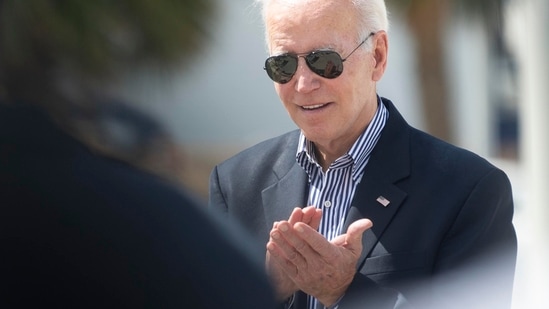Joe Biden has got the opposite of what he was hoping for: a major oil production cut of 2 million barrels a day from OPEC+, where Saudi Arabia is the prime mover.
World News
Published on Oct 06, 2022

When Joe Biden swallowed his pride and flew to Saudi Arabia in July to fist bump with Crown Prince Mohammed bin Salman, he expressed optimism that Riyadh would take steps to boost oil supplies “in the coming weeks.”
Instead, less than three months later, the US president has got the opposite of what he was hoping for: a major oil production cut of 2 million barrels a day from OPEC+, where Saudi Arabia is the prime mover.
For US officials, who spent the past few days in a frantic lobbying effort to persuade Riyadh and other members of the oil producers’ group to change course, the implication is clear: in the increasingly hostile energy war between Russia and the West, Saudi Arabia is willing to help Vladimir Putin and snub Joe Biden.
“It’s clear that OPEC+ is aligning with Russia with today’s announcement,” White House Press Secretary Karine Jean-Pierre told reporters
While Saudi officials said the cut is motivated by the concern over the global economy, the effect has been to trigger a rally in oil prices of more than 10% from last week’s lows. Against a backdrop of low inventories, some analysts warned the move could push prices higher still. Damien Courvalin at Goldman Sachs Group Inc. said the cuts could add $25 a barrel to Brent prices in 2023 should OPEC+ maintain them for the full year.
There’s “potential for price spikes even higher should inventories fully deplete,” Courvalin said.
For Biden, the decision to cut production is a blow. It is a personal rebuff to a president who had vowed during his election campaign to make Saudi Arabia a “pariah,” only to seek to patch up relations this year in the hope of securing higher oil supplies. It also hinders his attempts to bring down prices and squeeze Russia’s revenues -- by lobbying for a price cap on Russian oil and releasing stocks from the US strategic petroleum reserve.
“This cut was driven by geopolitics, not just market fundamentals,” said Ben Cahill, senior fellow at the Center for Strategic and International Studies. “OPEC+ is pushing back against efforts by oil importers to shape the market, including the price cap on Russian oil, US SPR releases, and coordinated action among buyers. It’s a risky move.”
The US was blindsided by the decision to pursue such a large cut, and as the producer group’s plans became clear in the past few days a succession of US officials including Treasury Secretary Janet Yellen called counterparts in Gulf OPEC members to try to persuade them to change course. She had calls with several regional ministers but got no firm commitments from them, according to people familiar with the matter.
On Wednesday, the White House said that Biden was “disappointed by the shortsighted decision by OPEC+ to cut production quotas” and threatened to consider further action to “reduce OPEC’s control over energy prices.”
Some US politicians were more forthright. Chris Murphy, the Democratic senator for Connecticut and a member of the foreign relations committee, tweeted: “I thought the whole point of selling arms to the Gulf States despite their human rights abuses, nonsensical Yemen War, working against US interests in Libya, Sudan etc., was that when an international crisis came, the Gulf could choose America over Russia/China.”
The production cut will be smaller in reality than on paper, at around 1 million barrels a day, because many OPEC+ countries are already pumping below their quotas -- a fact that will give US officials some comfort -- but the decision’s political impact is likely to reach beyond its effect on the market.
For MBS, as Saudi Arabia’s crown prince is universally known, the decision marks a return to the oil-fueled confidence that characterized the period before the murder of critic and columnist Jamal Khashoggi in 2018.
His economy is on track to be one of the fastest growing in the G20, he just helped broker a Russia-Ukraine prisoner swap, and he was last week named prime minister, expanding his powers on paper and potentially granting him immunity from lawsuits accusing him of ordering Kashoggi’s killing.
Saudi officials said the OPEC+ decision underscores the kingdom’s evolving foreign partnerships, driven in part by perceived slights from Washington. While some senior US officials have sought to repair the relationship, that hasn’t been enough to outweigh the fissures created partly by the president himself, the Saudis said.
On Wednesday, Saudi Arabia’s energy minister, Prince Abdulaziz bin Salman, refused to discuss the politics of the decision to cut production, saying only: “This is way above our pay grade.”
Asked to justify the decision to cut production in a market where prices remain relatively high, despite dropping from more than $130 in March, he pointed to the fact that natural gas and coal prices had risen by much more than oil.
For some, the analogy is ominous: the surge in gas and coal prices is the result of what the West sees as Russia’s use of gas a political weapon by curtailing supplies to Europe.
“After gas markets, now oil markets are getting weaponized,” said veteran OPEC-watcher Roger Diwan.
No comments:
Post a Comment